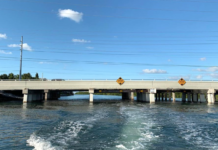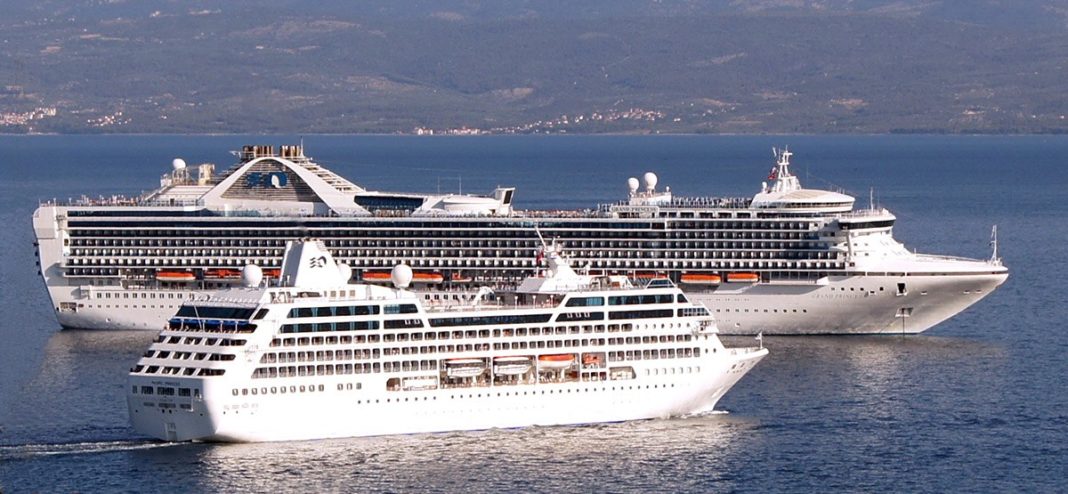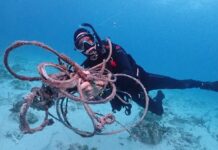As if the national political climate weren’t sufficiently contentious, the city of Key West is dealing with its own divisive debate over cruise ships.
Voters will decide on Nov. 3 whether to significantly reduce the number and size of cruise ships that come to Key West. The Safer Cleaner Ships Committee claims the environmental impacts of large cruise ships are detrimental to the island’s marine ecosystem, and the high number of passengers disembarking downtown detracts from the experience of overnight guests, who stay longer and spend more money.
The committee and its supporters say smaller cruise ships with their more upscale clientele will replace the revenue lost from larger ships that will be banned if the referendums pass. The committee founders have not met with operators of the smaller ships to confirm their future plans to visit Key West.
Multiple committees on the other side of the issue have organized to keep cruise ships in Key West, including Protect Our Jobs, Florida Harbor Pilots’ Association and Keep Cruise Ships in Key West, whose organizers have said they would work with SCS on cruise ship regulation and compromise. Those groups say the financial impacts to the city’s budget and to local businesses and workers will cripple the island’s economy. Whatever the voters decide, the referendums are binding and are expected to be implemented as soon as the election is declared official.
The two sides clashed again this week, when SCS stated in a newsletter, “City heads including Police Chief (Sean) Brandenberg, Fire and EMS Chief Alan Averette and Finance Director Mark Finigan all agree with Mayor Teri Johnston and Ports Director Doug Bradshaw: the referenda will have no impact whatsoever to tax revenue or essential services.”
When asked about the statement, Bradshaw responded, “That statement was never made by me and it is not my position. I have been quoted as saying we are basically at break even. This is true when you look at all costs, direct and indirect, based on the Cruise Ship Tariff Report in 2018. Bottom net income line was $91K for the 2017 year. However the revenue we collected and was allocated to indirect costs such as (police, fire), EMS, legal, the manager’s office, engineering, HR etc. was $1.7M, which now must be made up for in some fashion.”
Mayor Johnston told Keys Weekly on Oct. 14, “We have a $190 million budget. It’s just not going to do what these scare tactics are saying. Your taxes won’t skyrocket next year. We’ll still have an excellent police department, and our fire department will still be rated A1. Some positions might go away, but not the people. They’ll be reassigned.”
Finance director explains cruise ship revenues
City Commissioner Sam Kaufman has been asked repeatedly by constituents about the truth behind the financial impacts of cruise ships on the city’s budget, and finance director Mark Finigan on Oct. 13 drafted an explanation that he sent to each city commissioner. Finigan’s explanation is as follows:
“With the impending referenda there is a plethora of ‘less than accurate’ information being circulated. …The summary below may give you a better understanding:
“Getting your head around the ‘inflows’ and ‘outflows’ is made a little simpler when you break out operating expenses into two components; direct and indirect. The Navy lease, Outer Mole transportation, port security and allocated port operations costs are direct in nature. Better said, without cruise ships they are not needed. Direct costs are 100% allocable to the presence of cruise ships. No cruise ships – no direct costs. Indirect costs, or the $1.7 million for other departmental allocations, is a calculation by the consultant (based on inputs from departments) representing the amount of effort each city department contributes to the cruise ship activity. Not 100% obviously, but some reasonable fraction of the costs of a department. Example, Finance records revenues when received, processes purchase orders for services and supplies, budget folks monitor cruise ship activity for budget variances; you get the point. For that service the Finance department attributes a small percentage of its annual budget to the financial management of the cruise ships. Same methodology applies to police, fire, EMS, legal, the manager’s office, engineering, human resources, etc. All of those small percentages of departmental budgets add up to the $1.7 million.
That leaves at the bottom net income line $91,000 for the 2017 year. Here is the catch: No cruise ships, easy on the direct costs; you drop them. Not so easy on indirect since it would be impractical to cut my salary by 2% for the time during the year I supported the cruise ship activity. I would simply refocus that 2% on other departmental tasks. This same logic would extend to other departments that provide indirect support to the cruise ship trade.”


























